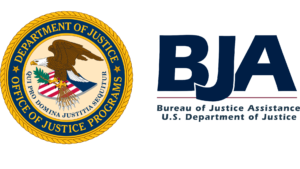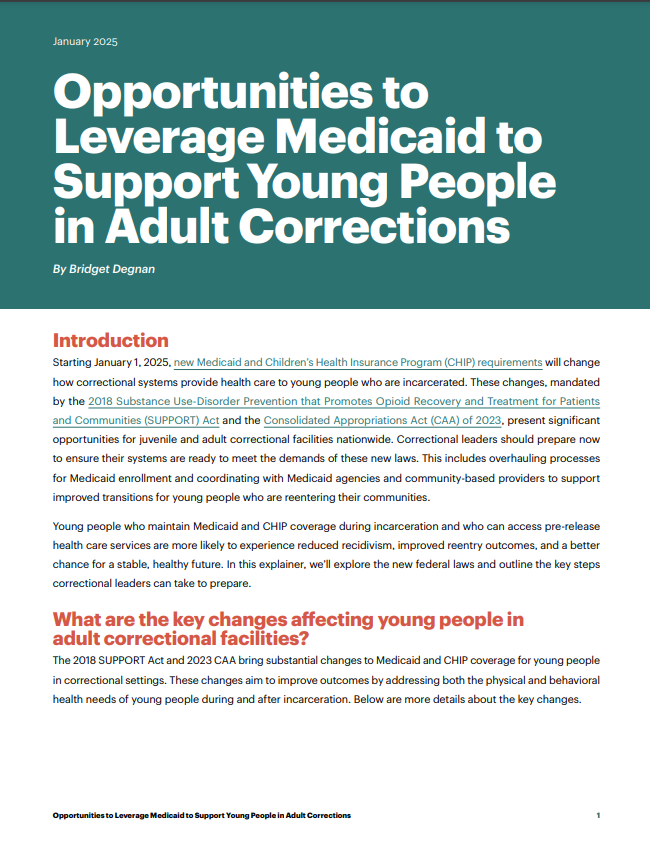Opportunities to Leverage Medicaid to Support Young People in Adult Corrections
Starting January 1, 2025, new Medicaid and Children’s Health Insurance Program (CHIP) requirements will change how correctional systems provide health care to young people who are incarcerated. These changes, mandated by the 2018 Substance Use-Disorder Prevention that Promotes Opioid Recovery and Treatment for Patients and Communities (SUPPORT) Act and the Consolidated Appropriations Act of 2023, present significant opportunities for juvenile and adult correctional facilities nationwide. Correctional leaders should prepare now to ensure their systems are ready to meet the demands of these new laws. This includes overhauling processes for Medicaid enrollment and coordinating with Medicaid agencies and community-based providers to support improved transitions for young people who are reentering their communities. Young people who maintain Medicaid and CHIP coverage during incarceration and who can access pre-release health care services are more likely to experience reduced recidivism, improved reentry outcomes, and a better chance for a stable, healthy future. In this explainer, we’ll explore the new federal laws and outline the key steps correctional leaders can take to prepare. Photo by SHVETS production via Pexels
Introduction
Starting January 1, 2025, new Medicaid and Children’s Health Insurance Program (CHIP) requirements will change how correctional systems provide health care to young people who are incarcerated. These changes, mandated by the 2018 Substance Use-Disorder Prevention that Promotes Opioid Recovery and Treatment for Patients and Communities (SUPPORT) Act and the Consolidated Appropriations Act (CAA) of 2023, present significant opportunities for juvenile and adult correctional facilities nationwide. Correctional leaders should prepare now to ensure their systems are ready to meet the demands of these new laws. This includes overhauling processes for Medicaid enrollment and coordinating with Medicaid agencies and community-based providers to support improved transitions for young people who are reentering their communities.
Young people who maintain Medicaid and CHIP coverage during incarceration and who can access pre-release health care services are more likely to experience reduced recidivism, improved reentry outcomes, and a better chance for a stable, healthy future. In this explainer, we’ll explore the new federal laws and outline the key steps correctional leaders can take to prepare.
What are the key changes affecting young people in adult correctional facilities?
The 2018 SUPPORT Act and 2023 CAA bring substantial changes to Medicaid and CHIP coverage for young people in correctional settings. These changes aim to improve outcomes by addressing both the physical and behavioral health needs of young people during and after incarceration. Below are more details about the key changes.
2018 SUPPORT Act
The 2018 SUPPORT Act prohibits the termination of Medicaid or CHIP coverage for individuals under 21 and former foster care youth up to age 26 during incarceration. Starting January 1, 2023, states may only suspend coverage, making it easier to resume coverage upon release. Note: The 2024 CAA set requirements for all states to suspend rather than terminate Medicaid for all adults and young people who are incarcerated, starting January 1, 2026.
States must also process Medicaid applications and redetermine eligibility for young people before their release from a correctional facility. In addition, the 2018 SUPPORT Act mandates that states provide coverage for medications to treat substance use disorders (SUDs) (also known as medication-assisted treatment or MAT) to all individuals who are eligible for Medicaid.
2023 Consolidated Appropriations Act
Section 5121 of the 2023 CAA mandates that, starting January 1, 2025, states must provide certain health services to eligible young people during the 30 days prior to release and for at least 30 days after release. These services include:
- Screening and Diagnostic Services: States must provide any screening and diagnostic services that meet reasonable standards or are medically necessary, including for both physical and behavioral health needs in accordance with requirements for Medicaid and the approved CHIP state plan. Services must be provided 30 days prior to scheduled release, no later than one week after release, or as soon as practicable after release. In addition, delaying a young person’s release to meet the pre-release requirement is not permitted.
- Targeted Case Management: States must provide targeted case management services, including assessment, referrals, development of a care plan, monitoring, and follow-up for appropriate care and services in the home and community, where feasible, in accordance with Medicaid and CHIP state plans. Services must be provided 30 days prior to release and continue for at least 30 days after release.
Section 5122 of the 2023 CAA gives states the option to extend Medicaid coverage to eligible young people who are incarcerated pending adjudication. If states opt in, they can provide coverage for health care services to eligible young people with or without formal adjudication. States exercising this option can incorporate it into the same State Plan Amendments submitted for Section 5121.
Note: For young people in federal facilities that do not participate in Medicaid and CHIP, states are required to ensure compliance with all service provisions after release, including screening, diagnostic, and case management services. For young people in state and local facilities that do not provide Medicaid and CHIP-covered services, states must similarly ensure compliance with services after release and must additionally maintain documentation showing that the services cannot be provided within the state or local carceral facility. Finally, in situations when a carceral facility is already providing the required services, providers in carceral settings do not necessarily have to enroll or bill in Medicaid and CHIP as long as the service requirements are met and are consistent with Medicaid and CHIP requirements. For more information, correctional administrators can review the FAQs published by the Centers for Medicare & Medicaid Services (CMS).
How will state implementation efforts be communicated to the federal government?
State Medicaid agencies (SMAs) must submit a Medicaid State Plan Amendment (SPA) and CHIP SPA to the CMS by March 31, 2025, with an effective date of January 1, 2025. These amendments will formalize how Medicaid and CHIP services will be provided to eligible young people in state correctional settings before and after their release.
What is an SPA? A Medicaid SPA is a formal document submitted by the SMA to CMS that outlines how the state will administer its Medicaid program, including any changes to coverage or benefits. SMAs must submit SPAs whenever they modify eligibility, benefits, or reimbursement under Medicaid. Similar to Medicaid SPAs, a CHIP SPA details how states will manage CHIP. It outlines changes to coverage, services, or benefits provided to eligible children and young adults.
Who is responsible? SMAs are responsible for developing and submitting both Medicaid and CHIP SPAs to CMS. This submission must include, in part, an attestation from the state Medicaid agency that the state has developed an internal operational plan to implement the required changes reflected in the SPA. The SMA must ensure compliance with federal guidelines while addressing the health needs of their state’s population, including people who are incarcerated.
What is the role of corrections? Correctional leaders should communicate their perspectives with SMAs as they develop the state’s operational plans to implement the new requirements and the subsequent SPAs, prior to submission to CMS. While correctional administrators may not directly draft these documents, their input will be critical to ensuring the plans reflect the realities of correctional settings and support successful reentry. Correctional leaders can provide data and insights that help shape the coverage of services like pre-release health care, behavioral health treatment, and case management.
Who are eligible young people?
Young People Under 21: Under the new requirements, eligible young people include anyone under 21 years of age who was eligible for Medicaid before their incarceration or is determined eligible while incarcerated. This also applies to young people eligible for CHIP up to the age of 19. In addition, it applies to both young people under 21 in juvenile detention and correctional facilities and in adult correctional facilities.
Young People Formerly Involved in the Foster Care System Up to Age 26: Medicaid coverage also extends to any young person who turned 18 in the foster care system and are therefore eligible to maintain Medicaid up to 26 years of age. This includes individuals who may have aged out of foster care but are later incarcerated. This applies to both young people in juvenile detention and correctional facilities and in adult correctional facilities.
Understanding Targeted Case Management
Targeted Case Management (TCM) is a Medicaid-covered service designed to help specific populations with complex needs, as defined by the state’s Medicaid plan, navigate the health care and social service systems. TCM can include:
- Assessment: Evaluating the health, social, and support needs of individuals, both before and after release.
- Collaborative Comprehensive Case Planning: Creating a detailed plan that coordinates physical health care, behavioral health services, housing, education, and employment supports.
- Referrals and Linkages: Connecting people to community-based services that address their health and social needs.
- Monitoring and Follow-Up: Ensuring that the services provided are effective and adjusting the case plan as needed.
For correctional leaders, working with the state Medicaid agency to ensure that pre- and post-release case management services meet the state’s definition of TCM will ensure that requirements are being met and eligible young people receive continuous, coordinated care that supports successful reintegration into the community.
What opportunities are available to adult correctional systems as a result of these changes to Medicaid and CHIP?
The 2018 SUPPORT Act and the 2023 CAA provide a framework that adult correctional systems can leverage to significantly improve outcomes for young people who are incarcerated. This framework includes opportunities to enhance mental health and substance use disorder treatment, access to physical health care services, and structured reentry support. By addressing the physical health, behavioral health, and health-related social needs of young people who are incarcerated, adult correctional leaders can improve the reentry process and reduce recidivism, leading to better long-term outcomes for young people impacted by the criminal justice system.
Behavioral Health Care Needs
Improved Access to Behavioral Health Care: Leaders in adult correctional systems can leverage screenings and diagnostic services to accurately assess the behavioral health needs of young people prior to their release, allowing for more targeted and effective treatments. Youth and young adults in correctional settings often have high rates of mental illness, SUD, and co-occurring disorders (CODs).1 By identifying and addressing these challenges early on, correctional leaders can increase the likelihood that young people are able to successfully reintegrate into the community after incarceration.2
Improved Access to Medications for Substance Use Disorders and Psychiatric Needs: Continuity of Medicaid coverage means that young people can maintain access to psychiatric medications as they transition back into their communities. Timely access to medications for conditions like depression, bipolar disorder, and schizophrenia can be a critical part of maintaining stability for a person reentering the community. In addition, young people will also be able to maintain access to medications for SUDs (often referred to as MAT) during reentry, which have been shown to be particularly effective for people with opioid use disorders, decreasing the likelihood of overdose upon returning home.3
Improved Access to Peer Support Services: Leaders in adult correctional systems can also train, certify, and employ or partner with community-based peer recovery support specialists who have lived experience with mental health or substance use disorders to improve reentry outcomes for young people. Another option is to partner with external organizations led by people with lived experience. Peer support has been shown to increase engagement in treatment, reduce feelings of isolation, and improve long-term recovery outcomes for people with SUD.4
Physical Health Care Needs
Improved Access to Physical Health Care: With Medicaid coverage mandated for screening and diagnostic services, correctional leaders now can coordinate these services more effectively, identifying physical health conditions before release and ensuring that young people have access to ongoing treatment. Covered services will allow for the identification of chronic conditions and provide young people with immediate access to primary care, dental care, specialists, and necessary medications, reducing gaps in care that often lead to health complications. There is also an opportunity to provide preventive health services, such as vaccinations and health education.
Continuity of Care: Leaders in adult correctional systems can use Medicaid and CHIP coverage to facilitate continuity of care for young people returning to the community after incarceration. Establishing relationships with community health care providers while individuals are still incarcerated ensures that appointments and follow-ups are already in place upon release. This reduces the chances of health care disruptions that could negatively impact physical and behavioral health.
Improved Reentry Transitions from Pre- to Post-Release
Structured Reentry Support: Leaders in adult correctional systems now have an opportunity to partner with Medicaid-covered case managers to ensure that young people receive comprehensive case management services before and after release. These services can include referrals to health care providers, mental health services, substance use treatment, housing support, educational opportunities, employment services, and family services.
Warm Handoffs: The federal changes to Medicaid will make it easier for correctional leaders to ensure warm handoffs during the reentry process, where case management is transferred smoothly from pre-release correctional caseworkers to post-release community-based case managers. Warm handoffs ensure that physical health, behavioral health, and social services are aligned with the individual’s needs and that goals are clear for their transition back to their community. Correctional leaders can choose to contract with community caseworkers to manage both pre-release and post-release services or use an existing or different model in their state. Other opportunities include implementing face-to-face meetings between young people, their families, correctional staff, and community service providers to ensure continuity of care.
Providing Early Periodic Screening, Diagnosis, and Treatment
Early Periodic Screening, Diagnosis, and Treatment (EPSDT) is a mandatory Medicaid benefit for individuals under the age of 21. It ensures that young people receive the health care services they need for physical, mental, and developmental well-being. EPSDT includes:
- Early Screening: Regular, comprehensive health assessments that include medical, dental, vision, hearing, and behavioral health screenings.
- Diagnosis: When a screening indicates a potential health issue, EPSDT covers diagnostic tests to determine the exact condition.
- Treatment: Medicaid must cover any medically necessary services to treat diagnosed conditions, whether those services are explicitly listed in the state’s Medicaid plan or not.
For correctional facilities, leveraging EPSDT means ensuring that young people have access to comprehensive health screenings and timely treatment for any physical or behavioral health conditions before and after release.
What key steps should correctional leaders take now?
Correctional leaders should take proactive measures to ensure that their correctional system is ready to meet the new requirements, which began to take effect January 1, 2025.
1. Establish partnerships with Medicaid agencies.
Partnerships with SMAs are essential for ensuring that Medicaid coverage is available to young people immediately before and after release. Partnerships should focus initially on producing strong state operational plans informed by the realities of corrections data, technology, and human resources.
Steps to Take:
- Initiate discussions with state Medicaid officials to collaborate on the state operational plan for handling suspension of Medicaid and CHIP eligibility during incarceration and reactivating benefits for young people 30 days before their release. If the SMA has written guidance on this topic, review that as a first step.
- Work together to develop an operational plan for pre-release enrollment and streamline processes to ensure all eligible young people are enrolled in Medicaid or CHIP before release. If possible, work to coordinate with other correctional leaders through Department of Corrections leadership and jail leaders’ associations such as the state’s sheriffs’ association.
- Align policies for case management and physical and behavioral health care access with Medicaid and CHIP benefits to ensure the operational plan addresses the full range of services needed by young people. This will require partnering with corrections staff, contracted physical and behavioral health providers, and community-based providers to ensure the new requirements are met.
2. Establish partnerships with physical and behavioral health providers.
Correctional leaders need to establish relationships with physical and behavioral health care providers and organizations to ensure ongoing care after release. These partners will be critical in providing collaborative comprehensive case management, treatment, and other support services.
Steps to Take:
- Identify providers, including Federally Qualified Health Centers (FQHCs), Certified Community Behavioral Health Clinics (CCBHCs), hospitals, and local health care organizations, who can provide services such as primary care, mental health services, and substance use treatment, including opioid treatment programs and telehealth services.
- Establish agreements with service providers to ensure access to mental health counseling, psychiatric services, peer support, and other key services.
- Coordinate with providers to develop continuity-of-care plans for young people transitioning out of correctional settings. This may include working jointly on existing reentry case plans or developing a new tool to assist with coordination.
Consider Coordinating with Juvenile Justice Systems
Juvenile justice systems are already working with many young people who need Medicaid-covered services. In addition, juvenile justice administrators are already required to create individualized reentry plans for these young people. Correctional leaders should consider coordinating care with juvenile justice systems and sharing best practices for Medicaid enrollment, behavioral health services, and targeted case management. This also provides correctional leaders with the opportunity to better understand the specific health care needs of young people involved in the justice system, helping them improve the transition from juvenile detention centers to adult correctional facilities and then to the community.
3. Establish partnerships to confirm former foster youth status.
Correctional leaders need to coordinate with their state or local Medicaid partners to understand former foster youth status for individuals up to age 26 who turned 18 while in foster care. This is essential for ensuring these young people remain enrolled in Medicaid or CHIP and receive covered services prior to release.
Steps to Take:
- Set up data-sharing agreements that align with the state operational plan to facilitate data exchanges between relevant social service entities and correctional systems.
- Develop a process for cross-referencing foster care records with young people who are incarcerated to identify who qualifies for Medicaid under the extended eligibility for former foster youth.
- Create a referral system to link these young people to the necessary services as they prepare for reentry.
4. Develop relevant data-sharing memoranda and agreements.
To coordinate services effectively and efficiently, correctional leaders must have agreements in place to share data with key partners, including Medicaid agencies, physical and behavioral health care providers, and the foster care system, and ensure that these are fully integrated into the state operational plan.
Steps to Take:
- Develop a secure data-sharing system that complies with federal and state privacy regulations (such as HIPAA and 42 CFR Part 2) to share critical physical and behavioral health and eligibility information with Medicaid and other service providers.
- Create data-sharing agreements that allow for the smooth transfer of information between agencies, in collaboration with community-based health care organizations and foster care systems.
- Include provisions in data-sharing agreements for tracking Medicaid and CHIP enrollment, health care services provided, and outcomes during reentry.
5. Develop internal protocols.
Correctional leaders need standardized processes for pre-release Medicaid and CHIP enrollment, reactivation of benefits, and documentation management to ensure compliance with the new requirements. These protocols should align with and support the broader strategies outlined in the state operational plan.
Steps to Take:
- Create internal workflows for identifying eligible young people 90 days before release, for Medicaid or CHIP enrollment and reactivation processes, and for billing processes for Medicaid-covered services.
- Standardize protocols for collecting and transferring medical records from correctional facilities to community health care providers to ensure continuity of care.
- Implement a system to document case management and other services provided before release to ensure continuity of services.
6. Establish a process for monitoring and evaluation.
Monitoring and evaluating the impact of these changes will be essential to ensure that the implementation of the new Medicaid requirements is effective and that young people are adequately supported in their reentry process. Correctional leaders should work closely with Medicaid agencies to ensure that the state operational plan includes strong provisions for ongoing monitoring and data collection.
Steps to Take:
- Establish collaborative research partnerships to support program monitoring and evaluation.
- Develop a monitoring system to track key metrics, such as the number of Medicaid and CHIP enrollments completed before release, services provided, and recidivism rates among reentering young people.
- Conduct regular evaluations to assess how well partnerships with Medicaid agencies, health care providers, and community organizations are functioning.
- Use evaluation data to make ongoing improvements to reentry planning, service coordination, and health outcomes for young people who are incarcerated.
7. Train correctional staff.
Staff must be prepared to support reentry, including understanding the role of Medicaid, the eligibility and enrollment processes, and how to support the reentry needs of young people who are incarcerated. Many of these trainings are offered for free, such as those found at the Justice Community Opioid Innovation Network (JCOIN) Training and Engagement Center.
Steps to Take:
- Implement training programs that educate staff on the Medicaid reactivation and enrollment processes, eligibility requirements, and the importance of maintaining continuity of care during reentry for young people.
- Provide specialized training on developmentally appropriate care for young people, focusing on mental health and substance use needs and trauma-informed care.
- Clarify roles and responsibilities for correctional staff, case managers, and correctional and community-based health care providers to ensure a cohesive approach to service delivery and Medicaid coordination.
Why is it important to act now and what does the future hold?
The new Medicaid and CHIP requirements began to take effect on January 1, 2025. As a result, correctional leaders need to ensure that Medicaid eligibility processes, data-sharing protocols, and partnerships with physical and behavioral health care and social service providers are in place in alignment with the SPA as soon as possible.
While these changes bring many benefits, there will also be challenges in developing infrastructure, establishing new policies and procedures, and training staff to meet the new requirements. Correctional systems will need to balance operational needs with the demand for expanded services. However, these challenges also provide an opportunity for increased access to Medicaid-reimbursable services, integration with community-based services, expanded correctional health care options, and improved outcomes for young people involved in the criminal justice system.
Correctional systems will increasingly coordinate care with community providers, creating new opportunities for integrated health services that address physical and behavioral health needs during and after incarceration. Telehealth may also play a larger role, especially in rural or underserved areas, to meet the health care needs of young people transitioning back into the community. By building these partnerships and systems early, correctional leaders will set the stage for better health care, improved reentry outcomes, and a reduction in recidivism for young people impacted by the criminal justice system.
This project was supported by Grant No. 15PBJA-23-GK-05504-MUMU awarded by the Bureau of Justice Assistance. The Bureau of Justice Assistance is a component of the Department of Justice’s Office of Justice Programs, which also includes the Bureau of Justice Statistics, the National Institute of Justice, the Office of Juvenile Justice and Delinquency Prevention, the Office for Victims of Crime, and the Office of Sex Offender Sentencing, Monitoring, Apprehending, Registering, and Tracking. Points of view or opinions in this document are those of the author and do not necessarily represent the official position or policies of the U.S. Department of Justice.


Endnotes
1. Patrick Köck et al., “Co-Occurring Mental Disorders in Transitional Aged Youth With Substance Use Disorders – A Narrative Review,” Frontiers in Psychiatry 13 (February 24, 2022): 827658, https://doi.org/10.3389/fpsyt.2022.827658.
2. Elizabeth S. Barnert et al., “How Does Incarcerating Young People Affect Their Adult Health Outcomes?” Pediatrics 139, no. 2 (February 1, 2017): e20162624, https://doi.org/10.1542/peds.2016-2624.
3. “Medication-Assisted Treatment (MAT) in the Jail and in the Community,” Stepping Up, accessed September 6, 2024, https://stepuptogether.org/resource_lab/medication-assisted-treatment-mat-in-the-jail-and-in-the-community/; Sheryl A. Ryan et al., “Medication-Assisted Treatment of Adolescents With Opioid Use Disorders,” Pediatrics 138, no. 3 (September 1, 2016): e20161893, https://doi.org/10.1542/peds.2016-1893; The Society for Adolescent Health and Medicine, “Medication for Adolescents and Young Adults With Opioid Use Disorder,” Journal of Adolescent Health 68, no. 3 (March 2021): 632–36, https://doi.org/10.1016/j.jadohealth.2020.12.129; “Medication-Assisted Treatment Improves Outcomes for Patients with Opioid Use Disorder,” The Pew Charitable Trusts, November 22, 2016, http://pew.org/2fLEhLA.
4. “What Is the Evidence for Peer Recovery Support Services?,” Recovery Research Institute, February 17, 2017,
https://www.recoveryanswers.org/research-post/what-is-the-evidence-for-peer-recovery-support-services/; Sarah Wurzburg, “‘A Resource for Change’: The Role of Peer Recovery Support Specialists in Reentry Programs,” CSG Justice Center, April 12, 2021, https://csgjusticecenter.org/2021/04/12/a-resource-for-change-the-role-of-peer-recovery-support-specialists-in-reentry-programs/.
Project Credits
Writing: Bridget Degnan, CSG Justice Center
Research: Bridget Degnan, CSG Justice Center
Advising: Sarah Wurzburg, CSG Justice Center
Editing: Alice Oh, CSG Justice Center
Design: Michael Bierman
Web Development: Yewande Ojo, CSG Justice Center
Public Affairs: Jen Wilburne, CSG Justice Center
About the Author

The Council of State Governments (CSG) Justice Center has launched the Collaborating for Youth and Public Safety Initiative…
Read MoreA bipartisan group of 88 lawmakers, led by Representatives Carol Miller (R-WV) and Danny Davis (D-IL), wrote a…
Read More Six States Commit to Improving Statewide Strategies to Address Youth Crime, Violence and Behavioral Health
Six States Commit to Improving Statewide Strategies to Address Youth Crime, Violence and Behavioral Health
The Council of State Governments (CSG) Justice Center has launched the Collaborating…
Read More Bipartisan Group of 88 Lawmakers Push for Continued Funding for Reentry and Recidivism Programs
Bipartisan Group of 88 Lawmakers Push for Continued Funding for Reentry and Recidivism Programs
A bipartisan group of 88 lawmakers, led by Representatives Carol Miller (R-WV)…
Read More










